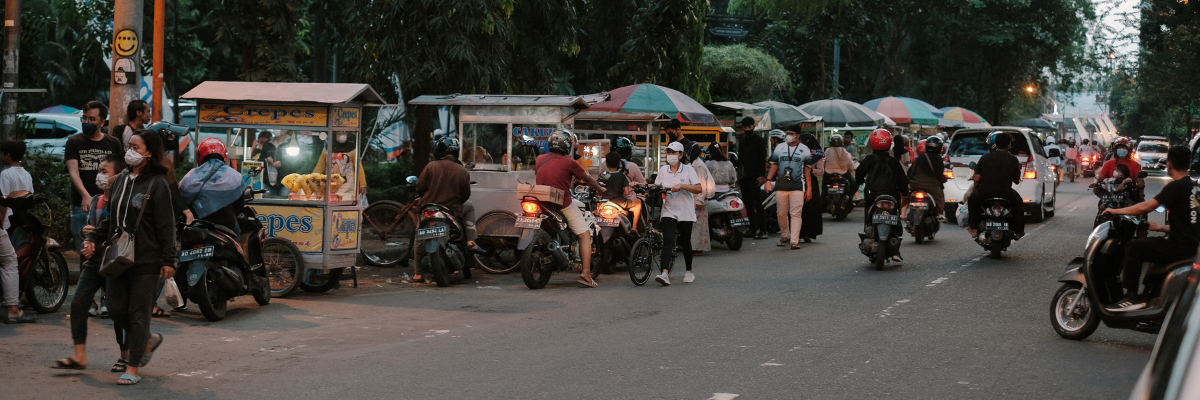Climate Foodprint in Indonesian Cities
Multiple cities
Indonesia’s agriculture is highly dependent on its climate. Increasingly frequent and intense extreme weather events and droughts, sea-level rise, and increasing irregularities in rainy season patterns are already impacting Indonesia’s agricultural production. Temperature increases and water availability have further heightened risks of crop failure and loss of livestock, threatening the country’s food security, among other factors. Indonesia’s National Development Planning Agency projected that agriculture production is predicted to decrease by around 10-17% due to decreasing water availability by 8% (2020).
Urban areas — with complex interconnected social, economic, environmental, political, and cultural processes — shape unique geographies and present unique implications on food systems. With unprecedented rapid urban growth alongside growing climate pressures, the issue of food security has arisen in the urban landscape, affecting not only people’s access to food but also the urban economic system as a whole. At the same time, food consumption patterns in the cities affect the global food system and contribute to carbon and greenhouse gas (GHG) emissions and climate change, reinforcing the positive feedback that exacerbates the impact of climate change on food security.
As part of The Think Climate Indonesia initiative (TCI), Kota Kita investigated the relationship between urban food systems and climate risks in Indonesian cities to offer insight into policies and activities that can help expose climate risks and vulnerabilities while improving the sustainability of urban food systems. The Think Climate Initiative is a three-year partnership supported by the International Development Research Centre (IDRC) and the Oak Foundation to enable local think tanks in Indonesia to engage more effectively in climate actions. The three-year partnership provides core funding for the organizational and research activities of five local think tanks: Kota Kita, Kaleka, World Resources Institute (WRI) Indonesia, PATTIRO Centre for Regional and Information Studies, and Partnership for Governance Reform (KEMITRAAN).
Investigating Climate Foodprint in Cities
Initially, the research focused on two cities with different socio-economic characteristics, climate risks and food vulnerability issues — Jakarta, the diverse and expansive capital city on the northern coast of Java, and Solo Raya, a small but growing inland city with a strong cultural identity and heritage — to offer insights into the policies that can help expose climate risks and vulnerabilities while improving urban food system sustainability. During the implementation, the research took an additional location, Semarang, to add perspective on the impact of the climate crisis on coastal communities and food production.
To answer the research questions, we broke down the research into modular research activities focusing on different aspects of urban food systems from markets and supply chains, the role of informal food actors, food behaviour and consumption patterns, coastal food systems, and documentation of existing sustainable urban food practices.
Download the research reports here:
- Summary of Key Findings (English)
- Menjahit Kenduri: Sebuah Pengantar Pangan di Perkotaan (Bahasa Indonesia)
- Meruah Rimpang: Prakarsa Ketahanan Pangan Alternatif di Perkotaan (Bahasa Indonesia)
- Cerita Warga Pesisir: Tantangan Iklim bagi Sistem Pangan dan Masyarakat Pesisir (Bahasa Indonesia)
- Pesanan Sesuai Aplikasi: Platform Digital dan Sistem Pangan Perkotaan di Jakarta (Bahasa Indonesia)
- Studi Lanskap Pangan Perkotaan Kota Solo (Bahasa Indonesia)
